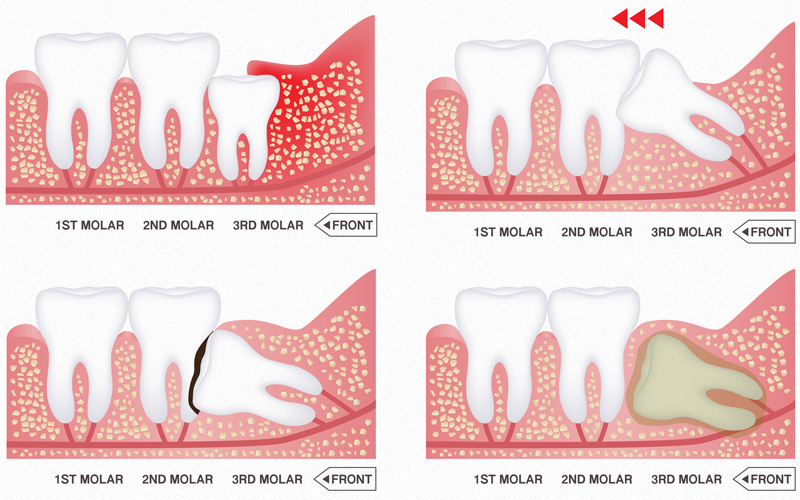Cardiff Open: Mon-Fri 9:00am-5:30pm (Sat 9am-4pm)
Singleton Open: Mon-Fri 9:00am-5:30pm (Sat Closed)
Fletcher Open: Mon-Fri 9:00am-5:30pm (Sat 9am-1pm)
Mayfield Open: Mon-Fri 9:00am-5:30pm (Sat Closed)
Cardiff : (02) 4954 7722
Singleton : (02) 6572 2526
Fletcher : (02) 4953 8614
Mayfield : (02) 4023 3885Laser Clinic
Wisdom Teeth Extractions
 What are Wisdom Teeth?
What are Wisdom Teeth?
Wisdom teeth are the third and final molar in your mouth that typically erupt from late teens to early 20’s. They are also called the ‘Third Molar’.
How Do I Know if I Have Wisdom Teeth?
Majority of us develop all 4 wisdom teeth. Some of us may only develop 3, 2, 1, or sometimes none. To find out if you have wisdom teeth, how many you have and the development of them, your dentist would need to take an OPG “orthopantomogram” which is a panoramic or wide view x-ray which shows all your teeth, the jaw, and the surrounding bones.
Reasons Why Wisdom Teeth May Need To Be Extracted?
Majority of the time wisdom teeth do not develop properly and will cause some issue at some stage in the future. The longer you leave the extraction of the tooth, the more difficult the extraction becomes due to the bone density and the recovery time lengthens. It is recommended that wisdom teeth are extracted between the ages of 20’s and early 30’s as your bone density is still easy to work with and your recovery after most procedures is faster than if you were older.
Issues that may arise due to wisdom teeth:
– Damage to the Other Teeth.
If your wisdom teeth are misaligned this set of molars can push the other teeth around. This could cause mouth pain, bite problems, or crocked teeth (especially after braces treatment)
– Jaw Damage / Cysts
Cysts can form around the new teeth. If they aren’t treated, they can hollow out your jaw and damage the surrounding nerves.
– Sinus Issues
Upper wisdom teeth can sometime sit on the bed of your sinus wall. Problems with the wisdom teeth can lead to sinus pain, pressure, and congestion.
– Inflamed Gums
When the wisdom teeth erupt the tissue around the area can swell and may be hard to clean. Sometimes the wisdom tooth may not completely erupt and a flap of gum may sit over the tooth and trap food and plaque.
– Cavities
Wisdom teeth are very hard to clean as they are so far back in your mouth. Lack of cleaning can assist bacteria to grow and cavities to form.
– Alignment
Impacted wisdom teeth can undo the effects of braces treatment. It can also affect any other dental treatment such as crown and bridge work or partial dentures.
What is the Procedure for Removing Wisdom Teeth?
Wisdom teeth can be removed in the dental chair. Or for more complex and difficult cases you may be referred to an Oral surgeon.
When extractions are done in the dental chair a local anaesthetic is used to numb the area of the extraction. The area is checked to confirm the numbness and then the tooth is slowly removed.
The Dentist will use specific dental equipment to assist in loosening the tooth from the bone and once the tooth is loose, the dentist will use the dental forceps to remove the tooth. For more difficult extractions the dentist may require sectioning the tooth and removing it section by section.
Once the tooth is removed the Dentist will assess the need for sutures. If they feel it is required they will place removable sutures in the area to assist with the healing. These will dissolve on their own within the next few days.
What do I do after my Wisdom Teeth have Been Removed?
It is important to follow the Dentist’s instructions once you get home to help in the healing of the extraction site.
- Rest at home after the extraction
- Depending on the number of teeth extracted you may need to take some time off work, school, or other duties.
- Avoid drinking alcohol
- Do not smoke, if possible do not smoke until the area is healed as smoking impairs healing.
- Eat soft foods such as soups (but not too hot), blended (pureed) vegetables and meats and jellies for the first two days.
- Drinks plenty of fluids
- Use icepacks to reduce any swelling and pain. – recommended 10mins on and 20mins off on the side of the extraction.
- If you have had any form of sedation – do not drive a car or ride a motorbike or bicycle, operate machinery, or engage in any active exercise for the rest of the day.
What to do During first 24 hours
- Do not spit or rinse out your mouth as this will dislodge any blood clot that is forming.
- Do not drink alcohol
- Do not smoke
- Apply icepack 10 mins on 20 mins off to reduce swelling and pain.
- Do not brush the area with your tooth brush.
What to do After 24 hours
- Very Gently Rinse with warm salty water. Rinse every four hours or more often if needed.
- Gently brush your teeth around the area.
- Treat any swelling after 24hours with heat. A warm face washer on the area for 20mins on and 20mins off will assist in reducing the swelling.
What Are Potential Complications of Wisdom Tooth Removal?
All types of surgery including the extraction of teeth, are associated with some risk.
Some possible complications are:
- Pain
Pain may occur once the numbness has worn off. Your dentist will advise you about what pain relief and prescribe the best tablets to take. - Bleeding
Although uncommon, haemorrhage may occur. It can normally be stopped by putting a piece of sterile gauze over the wound and apply pressure for 15-30 mins. If the bleeding continues, contact your dentist. - Dry Socket
This occurs if the blood clot that normally forms in the socket is washed away or dissolves, exposing the bone underneath. The blood clot is important for proper healing and pain relief. A dry socket causes a constant throbbing pain which may last for some days. If you have pain like this contact your dentist. - Infection
An infection in the gum or bone may occur after the extraction. If you develop a fever, bleeding or increasing pain, infection may be the cause. Contact your dentist at once. - Sinus Problems
The roots of some upper teeth may be close to the sinuses. Sometimes, a sinus may be opened when a tooth is removed. The opening will usually heal quickly. However, if an infection sets in or other problems start, more treatment may be required. - Damage to surrounding teeth
Although rare, the tooth or fillings next to the tooth to be removed may be chipped or loosened during an extraction. - Paresthesia
This is a rarer complication of wisdom teeth extraction. Wisdom teeth that are entrapped in the jawbone are often close to nerves. Sometimes these nerves can be bruised or damage during the tooth removal process. This results in numbness (called paresthesia) of the tongue, lip, or chin. This can last a few days, weeks, months or may even be permanent.
What is the cost for Wisdom tooth removal?
Cost for wisdom teeth start at $450
The cost of all dental extractions will vary on the difficulty of the extraction.
Can Sedation be organised for anxious patients?
In the case that you are anxious about getting your wisdom teeth removed, an oral sedation can be arranged prior to your treatment, such as Valium.
This will relax you whilst still being awake and able to communicate with the Dentist.
The Dentist will provide you with a script for you to fill and take 1 hour prior to your appointment. It is important to note that once you have taken the Valium that you are not able to drive, so you will need someone to drive you to and from your appointment.
MS Dental have employed the services of Dr Brad Moore.
Dr Moore is a General Dentist with a special Interest in Surgical Extractions.
He completes 98% of his treatment in the surgical extraction field.
He travels around other Locations to offer the same service.
With extensive knowledge in this field and years of experience, we are pleased to welcome this opportunity to you all.
With the options for IV sedation to your patients to complete treatment such as all four wisdom teeth removal, or Single in chair surgical extractions
Dr Moore attends the Cardiff practice on a regular basis and will perform complex wisdom teeth removal.
Prior to your appointment with Dr Moore you will have a consultation either inhouse or outhouse and a referral will be provided with a copy of xrays of the tooth that requires extraction to cardiff@msdental.com.au
We will contact Dr Moore with the information and If he feels further information is required you will be contacted by our Receptionist to arrange as needed.















